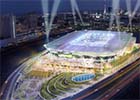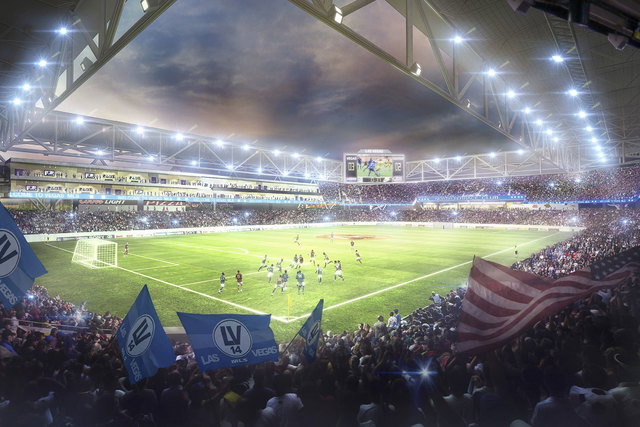Stadiums built without public money a rarity in U.S.
The Las Vegas City Council recently approved nonbinding plans for a $200 million soccer stadium that mandates no public money — but it’s a rare public-private stadium deal in this country that includes no public dollars.
Council member Bob Beers said he knew that from the body language of representatives of The Cordish Cos. and Findlay Sports &Entertainment moments after the City Council approved a soccer stadium deal last week. The terms of that deal came with the caveat that city staff work with Cordish/Findlay to eliminate public money.
From his council dais, Beers said he noticed the union workers in the back of the meeting room clapped when the city’s seven-member governing board approved the nonbinding stadium term sheet — but that the Cordish/Findlay partners failed to join the applause.
“It looked like they were surprised,” Beers said. “What they have been doing is applying to the city of Las Vegas for a grant and a loan. They have a fair amount of work ahead of them to produce minimum standards of materials that lenders require. That changed the scope of their job significantly going forward.”
Indeed, the city staff members, with Cordish/Findlay, face a stiff challenge to rework the stadium deal so that the proposed $3 million a year in public dollars for 30 years is cut from the equation. Cordish/Findlay wanted a subsidized soccer stadium to recruit the last available Major League Soccer expansion franchise to Las Vegas.
The majority of stadiums used by Major League Soccer teams were built with varying shares of public dollars, according to a stadium background sheet provided by MLS spokesman Dan Courtemanche. But there are a few MLS stadiums built without a public subsidy.
One privately built is the $95 million StubHub Center in Carson, Calif., home of the Los Angeles Galaxy and Chivas USA. That venue opened in 2003.
Anschutz Entertainment Group, which owns the Galaxy, built the stadium. AEG, owner of the LA Live entertainment district in downtown Las Angeles and the NHL Los Angeles Kings, also built the Staples Center without a public subsidy.
AEG has joined forces with MGM Resorts International to privately build a $375 million arena behind New York-New York on the Strip’s west side.
The Hunt Sports Group also built the privately financed Columbus Crew Stadium in Columbus, Ohio, where the Crew play. That 20,145-seat venue opened in 1999 at a cost of $34 million.
The proposed Las Vegas stadium has been pegged at $200 million — high for a 24,000-seat soccer venue because of the architectural features that will be needed to keep the place as cool as possible through the summer.
Stadium consultant Bill Rhoda of CSL, who worked for the University of Nevada, Las Vegas stadium board, which is seeking a separate campus stadium, said it’s rare for a stadium to be built without some form of a public contribution.
“Very few stadium deals have zero public dollars,” Rhoda said. “(It) makes it difficult to attract a team or expansion team.”
The council vote said the stadium deal needs to include no public dollars.
The proposed deal had also included $22 million from a tourism sales tax district and also $14 million in infrastructure improvements.
But four of the seven council members have focused on the annual $3 million request over 30 years, which would generate $90 million to borrow $46 million toward building the stadium on 13 acres of the 61-acre Symphony Park. The city would have used hotel room tax dollars, which are earmarked for parks projects, for the $3 million.
“My understanding is the room tax dollars were the ones of greatest concern to some of our council,” City Manager Betsy Fretwell said. “That will be our primary area of focus in the coming weeks.”
Las Vegas is competing against two front-running cities for the MLS team — Sacramento, Calif., and Minneapolis. An ownership group in Sacramento has proposed a privately financed soccer stadium of more than $100 million, prompting some Las Vegas residents to ask why can’t the same happen here.
Locals have another example of a privately financed sports venue only five miles from the soccer stadium site. It’s MGM-AEG’s 20,000-seat arena being built on the Strip.
On the same day that the City Council voted to move the soccer stadium deal ahead but without public dollars, MGM-AEG finalized its $200 million loan to build the $375 million arena, which is set to open in spring 2016.
“This partnership was committed from the start that this would be a privately funded arena, and we are proud to have accomplished this goal,” MGM Resorts Chairman Jim Murren said in a statement.
There’s also another privately financed arena planned for the Strip.
Former UNLV basketball player Jackie Robinson has said he is building a $690 million retractable-roof arena at the old Wet ‘n Wild site next to SLS Las Vegas on the north Strip.
Robinson has not asked for any public money for his arena project.
Contact reporter Alan Snel at asnel@reviewjournal.com or 702-387-5273. Follow @BicycleManSnel on Twitter.

An arena plan for Symphony Park
More coverage
Complete coverage of the various stadium and arena proposals.






















